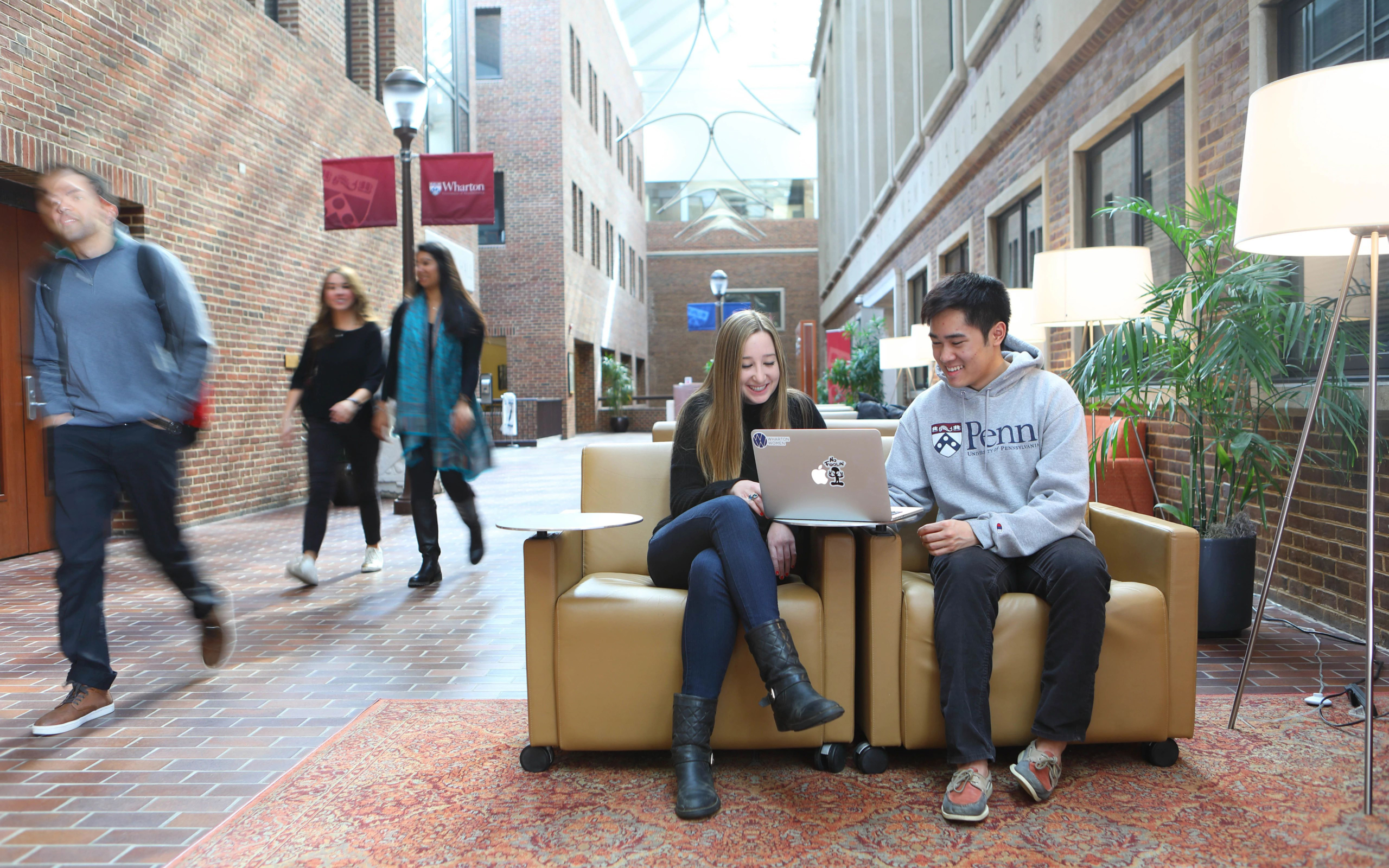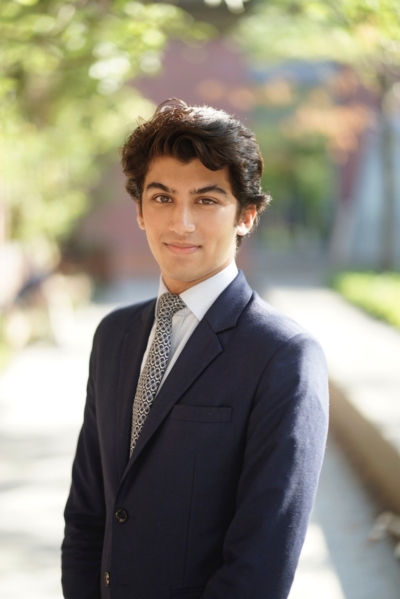
When most people think of finance, they envision some version of Gordon Gekko closing his infamous monologue with the “Greed is good” pitch. Since the release of Wall Street in 1987, this expression has become the punch-line of many finance jokes, as well as an axiom for how most of America sees the mindset of those in the financial industry. Some individuals, on the extreme end, see investors as caring about nothing more than the bottom line and having no regard for human life.
However, nothing could be further than the truth, and nowhere is that more evident than Social Impact at Wharton.
Social Impact is defined by Penn as “refer[ing] to the positive impact that individuals, businesses, and other organizations may have in reducing daunting and persistent social and environmental challenges.” In recent years, the topic has become a hot-button item that nearly every major institution—from car companies to Activist Hedge Funds—has begun to address.
Larry Fink, CEO of the asset management giant BlackRock, made headlines when he began to push sustainable investing in his annual letter. He even went so far as to call on companies to disclose climate risk in their reporting. Goldman Sachs Asset Management raised nearly a billion dollars for their debut impact fund. Personally, I once interviewed with a Silicon Valley Venture Capital firm that focused on Social Impact. With much conviction, my interviewer claimed that she believed impact investing would be the only viable type of investing in the future.
Increasingly, shareholders are demanding that companies be aware of their impact on communities, the environment, and other Environmental, Social and Corporate Governance (ESG) factors. As a result, interest in social impact will only continue to grow. Fortunately, Wharton provides the best resources in the industry to prepare for this burgeoning trend.

Wharton undergraduate students
YOU CAN CHOOSE CLASSES DESIGNED AROUND SOCIAL IMPACT
Wharton unveiled the Social Impact & Responsibility concentration a couple of years ago. It has quickly become one of the most popular options among students wanting to better understand how they can use business to positively impact the world. What is especially exciting about this unique concentration is its “broad, multidisciplinary, and evolving” nature (as Wharton eloquently puts it), which allows students to take courses in multiple different world-class departments.
Every Social Impact & Responsibility concentration student is required to take LGST 230: Social Impact and Responsibility. For those interested in the management side of things, you can also try out MGMT 241: Knowledge for Social Impact. If you’re interested in healthcare specifically, why not try HCMG 212: Healthcare Quality and Outcomes? Or perhaps you are more interested in the marketing side of things, go ahead and give MKTG 266: Marketing for Social Impact a go. Each of these courses, while taught by different departments, provides a rich overview of how business can make the world a better place and how said department’s area of focus can be applied for social impact.
I spoke with a friend of mine who took a very popular course among those more inclined towards finance, FNCE 254: Impact Investing. While she was initially unsure about how broad the opportunities were for social impact in finance, the class was an eye-opener to the several paths available for graduates with a passion for ESG and with the skills to back up that passion.
In FNCE 254, students analyze impact investing models, learn social impact metrics, understand government policy, and integrate novel social impact frameworks into traditional risk/return analyses. In the process, they are given the resources to stand out from the crowd that is becoming more and more sought after by employers.
Engaging with hands-on deliverables and situations allows students to better understanding how theory can apply to practical applications. These exercises ingrain lessons which would otherwise be forgotten, such as looking at corporate bonds beyond the interest they garner. Impact investors also ask themselves how communities are being affected by the purchase of this asset. Will it allow for infrastructure development in some way? Will it fund education initiatives? Will it make the world a greener place? These are the second degree questions prompted by having taken this class.
At the end of the class, students are asked to develop their own investment thesis or investment product designed around maximizing returns and social impact. One student even designed a fixed income product, which aids access to water. Needless to say, this class provides a unique opportunity to learn about a growing field and, contrary to what many think finance allows for, to be creative. My friend loved the class so much, she become a Teaching Assistant for it!
YOU CAN JOIN COMMUNITIES OF LIKE-MINDED PEERS PASSIONATE ABOUT SOCIAL IMPACT

Nicholas Imam
For students wanting to get involved in ESG work and go beyond the classroom, the Wharton environment provides ample opportunity to find a community that is right for them. Take for instance Wharton Impact Investing Partners (WIIP). For students wanting to get involved in ESG work and go above and beyond the classroom, the Wharton environment provides ample opportunity to find a community that is right for them. Take for instance Wharton Impact Investing Partners (WIIP). It was started all the back in 2007 before I knew what the words “social,” “impact,” or “finance” even meant. The club stands out as one of the oldest MBA (now also undergrad) impact investing groups in the nation and affords students “high-quality training on the investment process, impact investing, and portfolio management.”
If investing is not really your thing, you could also check out Penn International Impact Consulting (PIIC) or MUSE Consulting. Both these clubs work alongside NGOs and social enterprises and provide them with research and advice to increase their efficacy, all while giving students a chance to work on real-world social impact projects. Joining one of these organizations means joining established groups with successful track records going back years. For instance, since 2005, PIIC has partnered with over 80 different groups, giving them the help needed to evolve and grow.
Through association with these groups, students engage directly with non-profits by supporting their operations either through advice or financial investment. One such example is a company that WIIP worked with, Care at Hand. The organization is a “smart survey platform that uses observations of non-clinical providers to accurately predict and prevent admissions.” By investing in this company, the group was able to help provide access to quality healthcare for low-income and at-risk seniors. Beyond the philanthropic return, the investment also proved to be financially sound as the company was acquired by a health management company. As with classroom lessons, but in a more real-world scenario, members saw first-hand how ESG and return-oriented goals can be aligned.
YOU CAN TAKE PART IN WORLD-CLASS RESEARCH WHILE HAVING WORLD-CLASS SOCIAL IMPACT RESEARCHERS AT YOUR FINGERTIPS
Both undergraduates and MBA students at Wharton get access to the Wharton Social Impact Initiative (WSII). The cross-disciplinary center serves as the hub for research, training, and outreach to advance business-based solutions to social and environmental challenges. The center’s mission is to “strengthen the role of business in creating a more inclusive, equitable, and sustainable global economy.” That doesn’t sound much like Gordon Gekko’s philosophy to me.
The organization provides resources ranging from funding to societies. Not to mention, the group also publishes some of the most widely-read and revered social impact research in the world. Here, students can learn more about and get involved with include impact investing, gender lens impact investing, ESG reporting, CSR, microfinance, social entrepreneurship, and more.
Though the character is fictional and certainly made more detestable for the movie, I do wonder how a real-life Gordon Gekko might have changed his speech had he graduated from Wharton today. With so much emphasis being placed on using business to make Earth better for all, and with Wharton providing students with the resources to accomplish just that, I contend his monologue would have contained more positive verbiage.
Perhaps “Social Impact is Sexy.” What do you think?
Bio: Nicholas Imam is a Junior in the Wharton School at the University of Pennsylvania. He grew up in Kentucky and now lives in New York City. At Wharton, he is concentrating in Finance and Business Analytics with a Double Minor in Computer Science and Political Science. Outside of classes, he is involved with numerous clubs and organizations including Young Minds Matter NY, Wharton Ambassadors, and the International Affairs Association.
DON’T MISS: WORDS FROM A WHARTONITE: THE POWER OF OPTIONALITY











Questions about this article? Email us or leave a comment below.